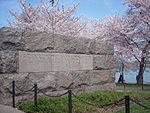The World War II Memorial is a memorial of national significance dedicated to Americans who served in the armed forces and as civilians during World War II.
Consisting of 56 pillars, representing U.S. states and territories, and a pair of small triumphal arches for the Atlantic and Pacific theaters, surrounding an oval plaza and fountain, it sits on the National Mall in Washington, D.C., on the former site of the Rainbow Pool at the eastern end of the Reflecting Pool, between the Lincoln Memorial and the Washington Monument. Its initial design was submitted by Austrian-American architect Friedrich St. Florian.
Opened on April 29, 2004, it was dedicated by President George W. Bush on May 29, 2004. The memorial is administered by the National Park Service under its National Mall and Memorial Parks group. More than 4.6 million people visited the memorial in 2018.
The memorial consists of 56 granite pillars, each 17 feet (5.2 m) tall, arranged in a semicircle around a plaza with two 43-foot (13 m) triumphal arches on opposite sides. Two-thirds of the 7.4-acre (3.0 ha) site is landscaping and water. Each pillar is inscribed with the name of one of the 48 U.S. states of 1945, as well as the District of Columbia, the Alaska Territory and Territory of Hawaii, the Commonwealth of the Philippines, Puerto Rico, Guam, American Samoa, and the U.S. Virgin Islands. The northern arch is inscribed with "Atlantic"; the southern one, "Pacific." The plaza is 337 ft 10 in (102.97 m) long and 240 ft 2 in (73.20 m) wide, is sunk 6 feet (1.8 m) below grade, and contains a pool that is 246 feet 9 inches by 147 feet 8 inches (75.2 m × 45.0 m).The memorial includes two inconspicuously located "Kilroy was here" engravings. Their inclusion in the memorial acknowledges the significance of the symbol to American soldiers during World War II and how it represented their presence and protection wherever it was inscribed.On approaching the semicircle from the east, a visitor walks along one of two walls (right side wall and left side wall) picturing scenes of the war experience in bas relief. As one approaches on the left (toward the Pacific arch), the scenes begin with soon-to-be servicemen getting physical exams, taking the oath, and being issued military gear. The reliefs progress through several iconic scenes, including combat and burying the dead, ending in a homecoming scene. On the right-side wall (toward the Atlantic arch) there is a similar progression, but with scenes generally more typical of the European theatre. Some scenes take place in England, depicting the preparations for air and sea assaults. The last scene is of a handshake between the American and Russian armies when the western and eastern fronts met in Germany.










